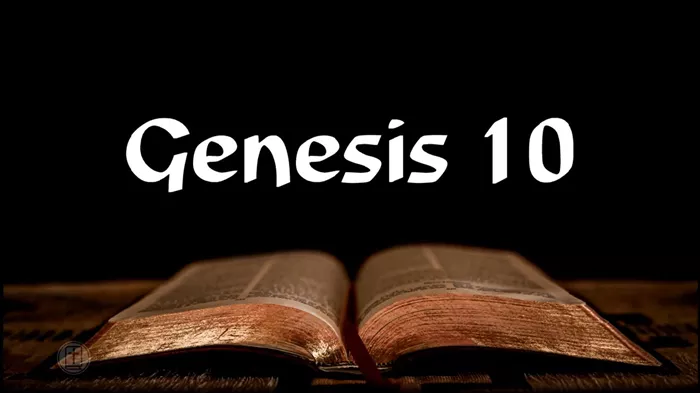Genesis Chapter 10 Summary
Genesis Chapter 10, often referred to as the “Table of Nations,” provides a genealogical record of Noah‘s descendants through his three sons—Shem, Ham, and Japheth. This chapter is significant because it traces the origins of the nations that emerged after the Great Flood, laying the groundwork for understanding the spread of humanity across the earth.
The descendants of Japheth are listed first, representing the peoples who spread out across the northern and western regions, often associated with the Indo-European nations. The descendants of Ham are next, including those who settled in Africa and parts of the Near East, such as Egypt, Canaan, and Cush. Finally, the descendants of Shem are listed, from whom the Semitic peoples, including the Hebrews, would emerge.
Genesis 10 serves not only as a historical record but also as a theological statement about the unity and diversity of humanity. It underscores the idea that all nations originate from a common ancestry, thereby emphasizing the interconnectedness of all people. The chapter concludes with a reminder that these nations spread out over the earth after the flood, fulfilling God‘s command to “be fruitful and multiply and fill the earth” (Genesis 9:1).
Bible Genesis Chapter 10
Welcome to read Genesis Chapter 10. Here is the list of Genesis Chapter 10:
What Does Genesis 10 Teach Us?
The Unity of Humanity
Genesis 10 teaches us that all human beings share a common ancestry through Noah and his sons. This genealogical record serves as a reminder that, despite the diversity of nations, languages, and cultures, humanity is fundamentally united. The chapter emphasizes the interconnectedness of all people, which has profound implications for how we view race, ethnicity, and the value of every human life.
The Diversity of Nations
While Genesis 10 highlights the unity of humanity, it also celebrates the diversity that arose as Noah’s descendants spread out across the earth. The chapter lists various nations and peoples, each with their distinct identities, languages, and cultures. This teaches us that diversity is part of God’s plan for humanity, reflecting the richness and variety of His creation. It encourages us to appreciate and respect the differences that exist among the nations.
The Fulfillment of God’s Command
The spread of nations as described in Genesis 10 fulfills God’s command to “be fruitful and multiply and fill the earth” (Genesis 9:1). This chapter shows that God’s purposes are being carried out through human history, even as people settle in different regions of the world. It teaches us about the sovereignty of God in guiding the course of history and the spread of humanity according to His will.
The Foundation for Future Biblical Narratives
Genesis 10 sets the stage for future biblical events, particularly those involving the nations mentioned in this chapter. Understanding the origins of these nations is crucial for interpreting later stories in the Bible, such as the interactions between Israel and its neighbors. This teaches us the importance of historical context in understanding God’s word and how the genealogies provide a foundation for the unfolding of His plan in human history.
The Significance of Blessing and Curse
The chapter implicitly reflects the effects of Noah’s blessings and curses on his sons and their descendants. The listing of nations in Genesis 10 can be seen in light of Noah’s pronouncements in Genesis 9:25-27, where he blessed Shem and Japheth and cursed Canaan, Ham’s son. This teaches us about the long-lasting impact of blessings and curses, not only on individuals but also on entire nations, and underscores the importance of living in a way that honors God’s covenant.
These five angles reveal that Genesis 10 teaches us about the unity and diversity of humanity, the fulfillment of God’s commands, the importance of historical context, and the significance of blessings and curses. This chapter provides valuable insights into the origins of the nations and their place in God’s unfolding plan for the world.


